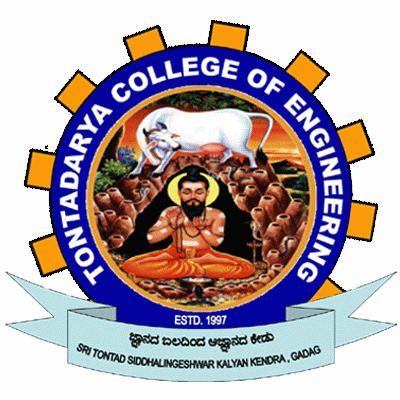STSKK'S
TONTADARYA COLLEGE OF ENGINEERING
Mundargi Rd, Panchal Nagar, Kalyan Nagar, Gadag, Karnataka 582101

DEPARTMENT OF COMPUTER SCIENCE AND DESIGN ENGINEERING
ABOUT DEPARTMENT
Welcome to the Department of Computer Science and Design, an emerging branch in the field of
Computer Science.
The current pace of advancement in this field has brought about a need for a specialized branch in
Design to address the necessity for designing and developing applications for a great user experience
and convenience.
This course is designed to provide students with a good insight into Computing techniques, digital
analytics, mobile application development, Animations, Virtual Reality and Virtual Augmentation
etc. While we delve deep in these areas, we also provide the breadth in other emerging technologies
such as Cloud computing, Cyber Security which is much required for an under graduate course of
this nature.
The objective of this program will be to provide an increasing focus on User Interface Design, User
Experience and other Design methods for a wide variety of IT products and services across all
industry verticals. It is imperative for us to create an environment of academic excellence, while
encouraging students to bring out their creative best, in this emerging and evolving field of Computer
Science, in order to prepare them for a promising career in this very competitive job market.
.VISION AND MISSION
VISION
To promote highly Ethical and Innovative Computer Professionals through excellence in teaching,
training and research.
MISSION
-
To produce globally competent professionals, motivated to learn the emerging technologies and to be innovative in solving real world problems.
-
To promote research activities amongst the students and the members of faculty that could benefit the society.
-
To impart moral and ethical values in their profession.
PROGRAMME EDUCATIONAL OBJECTIVES(PEO's)
PEO 1: To equip students with essential background in computer science, basic electronics and applied
mathematics.
PEO 2: To prepare students with fundamental knowledge in programming languages, and tools
and enable them to develop applications.
PEO 3: To develop professionally ethical individuals enhanced with analytical skills,
communication skills and organizing ability to meet industry requirements.
PROGRAM OUTCOMES (POs)
PO1: Engineering knowledge: Apply the knowledge of Mathematics, Science, Engineering
fundamentals, and an engineering specialization to the solution of complex engineering problems.
PO2: Problem analysis: Identify, formulate, review research literature, and analyze complex
engineering problems reaching substantiated conclusions using first principles of mathematics,
natural sciences, and engineering sciences.
PO3: Design/development of solutions: Design solutions for complex engineering problems and
design system components or processes that meet the specified needs with appropriate
consideration for the public health and safety, and the cultural, societal, and environmental
considerations.
PO 4: Conduct investigations of complex problems: Use research-based knowledge and
research methods including design of experiments, analysis and interpretation of data, and
synthesis of the information to provide valid conclusions.
PO 5: Modern tool usage: Create, select, and apply appropriate techniques, resources, and
modern engineering and IT tools including prediction and modeling to complex engineering
activities with an understanding of the limitations.
PO 6: The engineer and society: Apply reasoning informed by the contextual knowledge to
assess societal, health, safety, legal and cultural issues and the consequent responsibilities relevant
to the professional engineering practice.
PO 7: Environment and sustainability: Understand the impact of the professional engineering
solutions in societal and environmental contexts, and demonstrate the knowledge of, and need for
sustainable development.
PO 8: Ethics: Apply ethical principles and commit to professional ethics and responsibilities and
norms of the engineering practice.
PO 9: Individual and team work: Function effectively as an individual, and as a member or
leader in diverse teams, and in multidisciplinary settings.
PO 10: Communication: Communicate effectively on complex engineering activities with the
engineering community and with society at large, such as, being able to comprehend and write
effective reports and design documentation, make effective presentations, and give and receive
clear instructions.
PO11: Project management and finance: Demonstrate knowledge and understanding of the
engineering and management principles and apply these to one’s own work, as a member and
leader in a team, to manage projects and in multidisciplinary environments.
PO12: Life-long learning: Recognize the need for, and have the preparation and ability to
engage in independent and life-long learning in the broadest context of technological change.
PROGRAM SPECIFIC OUTCOMES (PSOs)
A graduate of the Computer Science and Design Program will have an
PSO 1: Ability to understand, analyze and develop efficient software solutions using suitable
algorithms, data structures, and other computing techniques.
PSO 2: Ability to independently investigate a problem which can be solved by a Human
Computer Interaction (HCI) design process and then design an end-to-end solution to it (i.e., from
user need identification to UI design to technical coding and evaluation). Ability to effectively use
suitable tools and platforms, as well as enhance them, to develop applications/products using for
new media design in areas like animation, gaming, virtual reality, etc.
PSO 3: Ability to apply knowledge in various domains to identify research gaps and to provide
solution to new ideas, inculcate passion towards higher studies, creating innovative career paths to
be an entrepreneur and evolve as an ethically social responsible computer science and design
professional.
SCHEME - Click Here to view
SYLLABUS - Click Here to view
Faculties

Mrs Uzma A Mujawar
Assistant Professor & Head
Department of Computer Science & Design
aliyasimran786@gmail.com
7204109538

Mrs. Prema Yellur
Guest lecturer
Department of Computer Science &
Design
premayallur@gmail.com
7353704156

Ms.Sadiqakushtar K Attar
Assistant Professor
Department of Computer Science & Design
Sadiqakushtar149@gmail.com
9513789526

